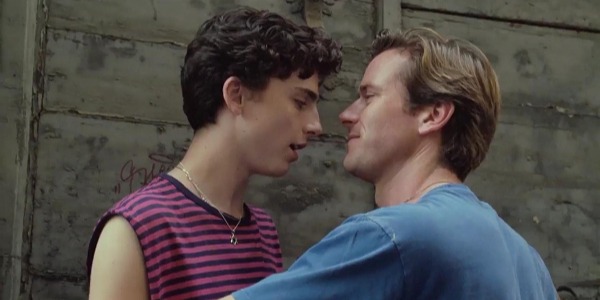Identity & Destruction In Luca Guadagnino’s Desire Trilogy

Alex is a film addict, TV aficionado, and book lover.…
With Call Me By Your Name lighting up festivals all year, director Luca Guadagnino has been through a gauntlet of press events trying to summarize the unique way his films hit audiences. What’s caught on is a description of Call me By Your Name as the closer to his so-called Desire trilogy, or as he less ostentatiously put it in an interview with Rolling Stone, “another movie about rich people lounging by the pool.”
It’s true that his three most recent films, I Am Love, A Bigger Splash, and Call Me By Your Name, do feature obscenely wealthy people and loads of pools, but the trio of films have deeper common threads that make them a rare arthouse trilogy.
The stories aren’t obviously connected; I Am Love is a melodrama about a woman giving up her privileged life for a young chef, A Bigger Splash is a thriller about a vacation upended by an old flame, and Call Me By Your Name is a coming-of-age romance. They don’t exactly scream trilogy, but Guadagnino’s approach holds them all together.
Rampant stylistic flourishes give them a rare intensity, and while each hinge on romantic dilemmas, they don’t contain themselves to lustful kisses and amorous banter. Good and bad come from his character’s actions, often in tandem and always deeply felt, swinging so wildly between highs and lows that only something as fickle as desire can justify the mayhem. It’s the conveyance of these small compulsions that make the three films feel like parts of a whole, a capturing of the ceaseless inner urges that motivate us all.
Desire As Your Base Self
Before getting too deep into the weeds of how Guadagnino expresses desire, it’s best to make sure we’re on the same page in terms of what desires really are. For one thing, they are not emotions, nor are they something we have control over. Desires are the basic wants that bubble up from some unconscious place, the stray thoughts about food, sex, or sensation: I want a cookie. I should get a blanket.

Emotions are often entwined with desires, sometimes giving rise to the desire or immediately informing its worth (click here for an article on desire vs. emotion if you want more information). That’s why it’s important, if you’re trying to capture desire, to also capture the associated emotions, but it’s also why only capturing emotions is insufficient to capturing desire.
Most filmmakers don’t bother to express anything deeper than the emotional lives of their characters, but with his last three films, Guadagnino scratched down to a more base level. The small things they saw, tasted, and touched were highlighted, tapping the audience into the visceral cues that give rise to his character’s desires.
For instance, in a standout scene from A Bigger Splash, Ralph Fiennes’ Harry shows the full range of his impulsive hedonism while dancing to The Rolling Stones. His shirt billows in the wind and the sun glistens on his hair as he writhes to the music, the picture of a bared, joyous soul. Inserted into this sequence is a moment of Dakota Johnson’s Penelope floating in the pool, a seductively beautiful thing, and also possibly his daughter. He shouldn’t be attracted to her, but in the moment he sees her lying there, awash with sexual cues, desire flickers in his head.
This is what I mean by scratching a tad lower. The film does address the inappropriate relationship in the usual ways (behavior and discussion), but it also shows the moments that spark it: how authenticity or the sight a slowly curling arm will cause immediate sexual desire. From there he adds in emotional signals and known societal expectations to build the jumbled mess we sort through in our heads during charged moments, like when a new lover walks by. By doing this repeatedly, he builds his characters into complex webs of shifting impulses and motivations, bringing to life something closer to a real person’s thought process than most filmmakers bother attempting.
Assertion Of Identity
Of course, people are not defined by the desires they experience, but by the actions they take based on them. We decide whether to act on an impulse, sometimes carefully and sometimes spontaneously, but other people never see the flurry behind the decision.
By tapping us into that flurry, Guadagnino gives us insight into how his characters weigh options and decide whether or not to act. His characters can be messier and less consistent because we have a deeper sense of what they’re dealing with, and their grand gestures are backed up by a series of small moments and connections that would otherwise be impossible to convey.

This is most directly addressed in I Am Love, which follows Tilda Swinton’s Emma Recchi, introduced as an unassuming housewife, blossoming into her true self through an affair. Another film may have told this as a straightforward romance, but here Guadagnino uses quick cuts and zooming cameras to give a sense of the turmoil going on behind her placid exterior. She’s not only falling in love, feeding off her daughter’s burgeoning romance with a woman, but also unpacking a past she gave up in order to be a part of this family.
By engaging in the affair and by nurturing it into a loving relationship, she’s asserting a long abandoned sense of self-worth. Being in a truly loving relationship means demanding space and time in another person’s life, and in the climactic moments of I Am Love, Emma finally demands this from other people.
Call Me By Your Name has its characters making similar demands (and, you know, coming out as either gay or bisexual) while A Bigger Splash frames the romantic desires around the allure of a more exciting but tumultuous life. All of these characters are deciding who they want to be, sometimes by embracing and other times by rejecting their base desires, and Guadagnino gives the audience a front-row seat to everything.
The Destructive Force Of Carnality
All of this means that we have films about people identifying and embracing who they are, which given today’s messaging about being yourself and finding your happiness means that these films are full of joy and happy endings, right? Except they absolutely are not.
Guadagnino has crucially chosen stories about uneasy desires, ones that leave a wake of pain and destruction even when the ‘right’ choice is made. The messy thing about desires is that they don’t follow any sort of logic or rules, so at times they contradict each other and leave a person with no clear way forward.
Rather boldly, Guadagnino embraces this mess and acknowledges that there’s no way to get everything we want. That’s why we have to chose, define ourselves by these choices, and live with the ramifications. Swinton’s Emma gets moments of great passion and pleasure in I Am Love, but she also causes the death of her son and the breakup of her family. It is, on some level, a selfish choice, and she pays a price.

There’s a death in A Bigger Splash as well, along with a hanging threat to each of the main players’ lives. But it’s Call Me By Your Name that makes the most succinct statement on the good and bad that comes from following your desires.
Timothèe Chalamet’s Elio has spent a summer falling into his first love, and as he comes down from the tremendous highs of this experience, he is marked deeply by the loss. Going through these highs and lows for the first time is a pivotal moment in anyone’s life, and as he wanders about stunned by the wound, his father takes hims aside and gives a speech on embracing the experience and being open to it again.
It’s a simple message when it comes down to it, but nevertheless one that’s hard to swallow. Elio gets a moment to reconcile this with his own experience in a bravura credits sequence where a flood of emotion passes across Chalamet’s face. Guadagnino lets this moment sit, having done the work of spinning a yearning romance over the previous two hours. The audience knows precisely what Elio wants, and what he will likely never have again.
Still, Elio and all of Guadagnino’s characters have no choice but to contend with their desires. They’re always swirling around, and if the choice is between inflicting some damage or never experiencing the rush of a fulfilled desire again, then he’s made a clear argument for the former.
What are your thoughts?
Does content like this matter to you?
Become a Member and support film journalism. Unlock access to all of Film Inquiry`s great articles. Join a community of like-minded readers who are passionate about cinema - get access to our private members Network, give back to independent filmmakers, and more.
Alex is a film addict, TV aficionado, and book lover. He's perfecting his cat dad energy.













